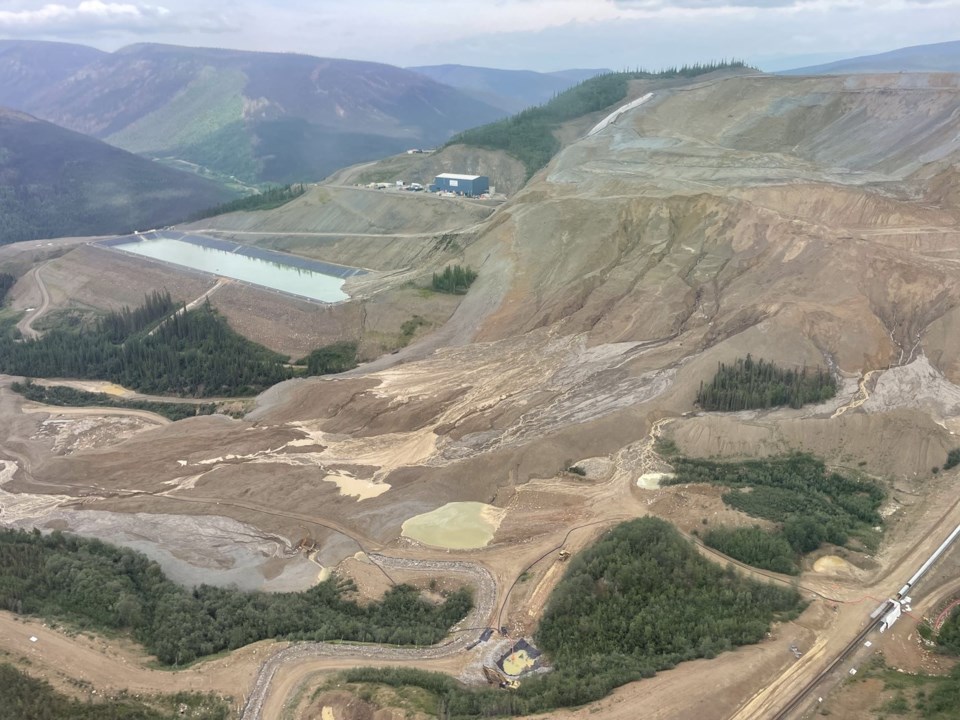WHITEHORSE, YUKON — A Yukon mine inspector has ordered Victoria Gold to shore up its water treatment efforts, finding the company's plan to clean up after a disastrous spill of cyanide-laced-rock and water last month at its Eagle Gold mine is insufficient.
In an inspector's direction issued July 20, mine inspector Sevn Bohnet said Victoria Gold was required to come up with a water treatment plan earlier this month, and the company submitted a pair of "unsigned memos" in response.
The memos, the inspector's direction says, don't "sufficiently describe" the company's ability to handle and treat the amount of contaminated water at the site, including its ability to source "large quantities of reagents," the compounds or substances needed for the water treatment process.
The company's "groundwater interception plan" is also insufficient because it doesn't describe how it would "effectively" intercept groundwater in the Dublin Gulch valley, the document says.
About two million tonnes of ore spilled over an embankment in the heap leach facility at the mine site on June 24, resulting in a landslide 1.5 kilometres long and the escape of about 300 million litres of the cyanide solution. The mine had been using the cyanide solution to percolate through the crushed ore to extract gold.
An earlier Yukon government direction issued to the company required Victoria Gold to build a water storage facility to hold up to 50,000 cubic metres of contaminated water by July 15, but Bohnet's latest direction says two days after that deadline, "a natural resource officer observed that no lined water storage facility had been constructed."
The direction orders the company to meet six new conditions, including not to discharge contaminated water that can't be completely contained, to build more water treatment capacity and to provide "certainty" that it can treat between 15,000 and 20,000 cubic metres of contaminated water a day, among other conditions.
“This series of additional directions is aimed at addressing potential stability risks of the heap leach facility, and enhancing contaminated water storage and treatment, which includes setting up a system to pump and treat groundwater," Yukon Mines Minister John Streicker said in a statement Tuesday.
“The Government of Yukon is applying a progressive enforcement approach to the Eagle Gold failure response," the statement said. "The inspector’s directions issued on Saturday build on the previous ones and are based on our updated understanding of the site conditions and potential risks."
Randi Newton, conservation manager with the Yukon chapter of the 91Ô´´ Parks and Wilderness Society, said Victoria Gold hasn't come up with a "viable plan" to treat contaminated water at the site.
"When I looked at the direction, what stood out to me is Victoria Gold's complete and utter failure to respond in a capable way to this disaster," Newton said. "I hope it signals that the Yukon government will step in in a more concerted way this week because the company can no longer be counted on to do so."
Newton said both the territorial and federal governments should take on a greater role and should treat the heap leach facility failure as "the emergency that it is."
She said the millions collected as security for the mine by the government accounted for an "orderly closure" of the Eagle Gold mine, rather than a catastrophic failure of its heap leach facility.
"This is going to be very complex and very expensive," Newton said.
The company did not reply to emails or phone calls for comment on the inspector's latest direction.
Yukon officials said at a technical briefing last week that the government was "contemplating" stepping in at the mining site, and would convene an expert-led independent review to determine the cause of the disaster.
In a public statement issued July 12, Victoria Gold said production at the mine has been suspended, and may never restart without government authorization.
"Victoria will continue to work to minimize impacts to the environment, with the safety of employees as a foremost priority," the statement said, adding that Victoria Gold may not "have the financial resources necessary to repair damage to equipment and facilities or remediate impacts caused by the incident or restart production."
— By Darryl Greer in 91Ô´´
This report by The 91Ô´´ Press was first published July 23, 2024.
The 91Ô´´ Press



